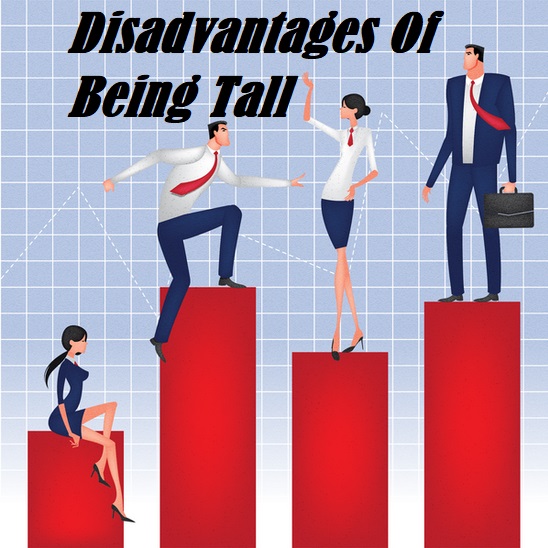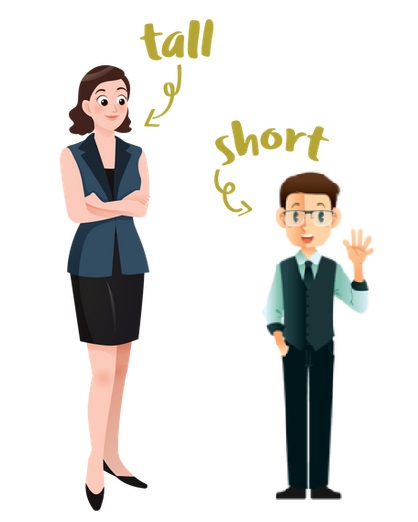I hope you love the products I've recommended below, just a heads up that as an Amazon Associate, I earn from qualifying purchases. This means I may earn commissions on products bought via links on this page.

If you’re an aspiring young tall person, I think you will be pleasantly pleased by the results as we analyze why tall people earn higher income on average and the percentage of tall people in the richest person list.
The general perception that people of different heights have equal opportunities to succeed in life is just a telltale. A number of studies have shown that taller people tend to earn more than their shorter counterparts, even when all other factors such as education level and technical skills are held constant.
Evidence That Taller People Get Paid More
According to a study titled “Standing Tall Pays Off” that was published in the Journal of Applied Psychology in 2004, additional height comes with many perks and money is one them. The study found out that an inch of height can add about $800 a year.
There is also evidence from this study that there exists a height bias in the workplace, which influences interactions and salaries. This comes from the theory that back in the day, height may have been seen as a power element and while in this modern age it’s considered discrimination, the subconscious battle may still be lurking. So without an employer actually saying it, a tall person may be higher praised due to this deeply embedded subconscious idea.
Another study, “The stature of the self-employed and its relation with earnings and satisfaction” published in the Journal of Economics & Human Biology also traced significant association between height and success in life.
But Why Does A Tall Person Tend To Earn More Money
The Human Subconscious
As briefly mentioned already, during the earliest stages of organization, humans used height to make decisions for power. The tallest men were chosen to lead in fight situations. While physical stature may be less important in today’s civilized way of living, the innate preference for greater height is still with us.
It could be that the brain automatically interprets height as an index for health, power, and wealth. These quick decisions by the brain are referred to as heuristics, or decision-making shortcuts in the study of psychology.
Humans have a sense of what a leader should look like, and according to how our brains are wired, tall people are leader-like. Researchers say that preference for greater height boils down to evolution. In the caveman days, selecting the tallest men to lead the tribe was seen as wise because such people would be able to physically defend the people. In addition, taller individuals are more likely to put themselves forth in leadership situations than shorter folks and were generally considered stronger.
Better nutrition
Nutrition is a key factor for professional development and success. The majority of individuals with above-average height were better fed as kids. Good nutrition also enhances the development of cognitive and non-cognitive skills. This is the key nutrition-influenced factor that links height with success.
Nutrition also influences physical strength. Since taller people are viewed as and are often stronger, they do far much better in jobs that need physical strength. The trend is also observed in desk-based roles. While genetics are the main contributor to why some people are taller, nutrition plays a very important role as well.
Greater Self Confidence
Taller people in all work settings tend to earn more because they have more self-confidence and emotional intelligence. In economies where higher social status is accorded to entrepreneurs, it is expected that entrepreneurs are generally taller than wage workers.
Just look at Superman, he’s bullet proof and happens to be well above average height (Around 6’3″).
In a study on the relation of stature of the self-employed with earnings and satisfaction, data collected by the German government was used to investigate the professional lives of relatively taller men. According to this study, a one centimeter increase in height translates to:
- 0.15 percent rise in the probability of being self-employed
- A 0.39 percent and 0.52 percent increase in hourly earnings for a paid employee and a self-employed individual, respectively.
Richer & More Successful In Life
The findings also showed that having an inch more makes one more likely to be happier and more successful in life. Employed people who were taller than average indicated that they were happier with their jobs than those who were shorter. Job satisfaction is highly correlated with more earnings and career success.
I know I’d be happier if I got paid more due to being a few inches taller.
In the world of fashion, height is appreciated more handsomely. Work attire is a key factor for compensation, but taller individuals generally earn significantly more that shorter guys. Success in this industry is beyond “dressing the part”. It is more about maximizing the appearance, and more height is such a blessing in this regard.
Tall People: More Socially Engaged
Social skills are of critical importance in the workplace. An individual’s height in adolescence is highly meaningful for their adult career. Boys who are taller in teenage are more likely to engage themselves in social activities that build their social capital.
Studies have shown that adolescent experiences explain a lot about the higher earning capability, especially of taller adult men. Those men who were shorter in adolescence have lower earnings even if their heights catch up towards adulthood.
Looking across many samples of people, it can be seen that there is an association of height with different markers of success in life. This is not to mean that taller people are always better, it is just that greater height gives a bit of an advantage.
Rich Tall Business Men & Women
The implication of this phenomenon in the business world can be seen by looking at the CEOs of Fortune 500 companies. Many are of above-average height with the exception of Jeff Bezos (Amazon) 5’6″. Such as:
- John S Watson (Chevron) 6’4”
- Bob Dudley (BP) 6’3″
- Tim Cook (Apple) 6’3″
- Matthias Müller (Volkswagen) 6’2
- Gina Reinhart One of the richest Women in the world 5’81/2″
Now no one can ever say, “he/she is too short to be CEO”. Society tends to trust taller people, and businesses consider tall as a good image for their businesses.
Height is used naturally as a proxy for power. It gives taller guys and girls a leeway toward positions of leadership, and consequently higher incomes.
Present Yourself Tall
It is important for everyone to know what to do to derive full value from his or her stature. It makes a lot of sense to wear attire that optimizes your height. Maintaining a good posture is also a good way to maximize height. On average, poor posture robs a person one or two inches. If you sit staring at a computer or smartphone for the better part of your day, doing a few rounds of posture enhancing exercises during your office routine can be highly beneficial.
Standing tall, shoulders high and chest pushed outwards can also help to make one appear taller and thus tap into the associated benefits. This is especially important when making presentations or appearances in interviews and meetings in competitive environments.
It’s not uncommon for people that want to appear taller to wear shoe insoles or lift (elevator )shoes. While this can be considered deceptive at times, in the right circumstances there is no harm.
It is also noteworthy that the positive association between greater height and cognitive ability is the major explanation of the height premium in earnings. This is because cognitive ability is what the labor market rewards. Only a few industries (such as sports and fashion) put a lot weight on height when selecting competitors. In most of the other industries making up the corporate world, greater height that is not accompanied by better cognitive ability is almost useless.






